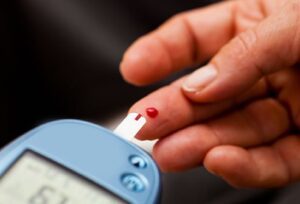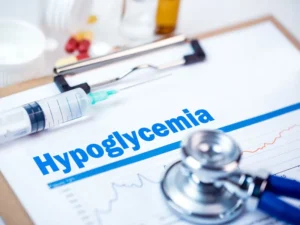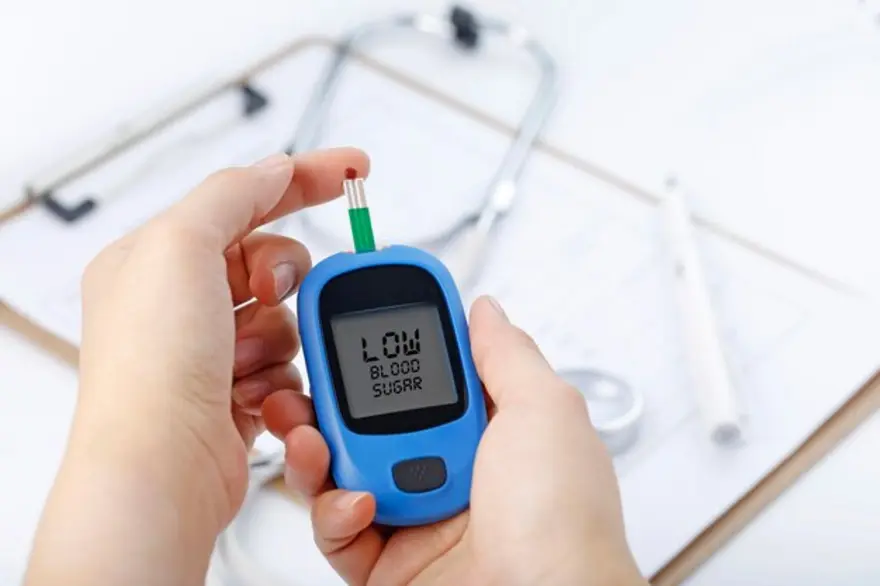Persistent hypoglycemia, characterized by abnormally low blood sugar levels, can be a daunting challenge for those affected and their caregivers. Understanding the underlying causes, recognizing symptoms, and implementing effective persistent hypoglycemia treatment strategies are crucial to maintaining stable blood sugar levels and enhancing quality of life. This guide aims to shed light on the complexities of persistent hypoglycemia, offering insights into its management through medical intervention, lifestyle adjustments, and continuous monitoring.
Contents
What Causes Persistent Hypoglycemia?
 Persistent hypoglycemia, or recurrent low blood sugar levels, can arise from a variety of causes and underlying conditions. It’s important to identify the specific cause to manage and treat the condition effectively. Here are some of the primary causes:
Persistent hypoglycemia, or recurrent low blood sugar levels, can arise from a variety of causes and underlying conditions. It’s important to identify the specific cause to manage and treat the condition effectively. Here are some of the primary causes:
- Excessive Alcohol Consumption: Drinking alcohol, especially on an empty stomach, can inhibit the liver’s ability to release glucose into the bloodstream. Thus, leading to hypoglycemia.
- Severe Liver Disease: The liver plays a key role in regulating blood glucose levels. Severe liver diseases, such as cirrhosis, can impair this regulatory function. And, leading to hypoglycemia.
- Insulinoma: This is a rare tumor of the pancreas that produces excess insulin, leading to hypoglycemia.
- Endocrine Disorders: Certain disorders of the adrenal glands (such as Addison’s disease) and the pituitary gland can result in insufficient production of hormones. This helps regulate glucose production, leading to hypoglycemia.
- Kidney Disorders: The kidneys play a role in removing insulin from the blood. Kidney disorders can lead to prolonged insulin action and hypoglycemia, especially in individuals with diabetes.
- Metabolic Disorders: Rare congenital metabolic disorders can interfere with the body’s ability to produce, store, or release glucose properly, leading to hypoglycemia. These disorders are more commonly diagnosed in infants and children.
- Prolonged Starvation or Malnutrition: Inadequate food intake can deplete the body’s stored glucose. This is needed to maintain normal blood sugar levels.
- Medications: Besides diabetes medications, other medications, including some used to treat kidney failure, malaria, and certain conditions, can cause hypoglycemia as a side effect.
Understanding the cause of persistent hypoglycemia is essential. It will help in determining the most appropriate treatment and management strategies. It typically involves medical evaluation, including detailed medical history, physical examination, and diagnostic tests to identify the underlying cause.
What Is The Immediate Treatment For Hypoglycemia?
Immediate treatment for hypoglycemia (low blood sugar) is critical to quickly raise the blood sugar level to a normal range. Also, prevent more serious symptoms, including loss of consciousness or seizures. The standard immediate treatment follows the “15-15 Rule.” This can be adjusted based on individual needs and medical advice. Here’s how it works:
- Consume 15 Grams of Fast-Acting Carbohydrates: This can include glucose tablets (as per the package instructions to equal 15 grams of carbohydrates), 4 ounces (about 1/2 cup) of regular (not diet) soda or fruit juice, 1 tablespoon of sugar, honey, or corn syrup, or hard candies, jellybeans, or gumdrops (check the package to determine how many equal 15 grams of carbohydrates).
- Wait 15 Minutes and Check Blood Sugar Levels Again: After consuming the carbohydrates, wait about 15 minutes. And then recheck blood sugar levels. If your blood sugar is still below 70 mg/dL (3.9 mmol/L) or you still feel symptoms of hypoglycemia. Then, consume another 15 grams of fast-acting carbohydrates.
- Repeat if Necessary: Continue checking your blood sugar every 15 minutes and consuming 15 grams of fast-acting carbohydrates until your blood sugar is at least 70 mg/dL or your symptoms improve.
- Follow Up with a Snack or Meal: Once your blood sugar is back to normal and if your next meal is an hour or more away, eat a small snack. This could be half a sandwich, a piece of fruit with peanut butter, or any snack that contains both carbohydrates and protein to help stabilize your blood sugar.
For individuals with diabetes or those who are prone to hypoglycemic episodes, it’s important to always carry some form of fast-acting carbohydrate with them. In cases where someone is unable to swallow or unconscious, do not try to give anything by mouth to avoid the risk of choking. Instead, an injection of glucagon should be administered if available, and emergency services should be called.
What Are Some Effective Persistent Hypoglycemia Treatment?
 For persistent hypoglycemia treatment beyond the immediate tips, a comprehensive approach is often required. Here are some effective strategies for persistent hypoglycemia treatment:
For persistent hypoglycemia treatment beyond the immediate tips, a comprehensive approach is often required. Here are some effective strategies for persistent hypoglycemia treatment:
Medication Adjustments
- Adjusting Diabetes Medication: Diabetes medications, especially those that increase insulin in the body, are a common cause of hypoglycemia. A healthcare provider may recommend changing the type of insulin, adjusting the dose, or altering the timing of injections. For non-insulin medications, alternatives that have a lower risk of causing hypoglycemia may be considered. Such as switching to medications that do not directly stimulate insulin release.
- Alternative Medications: In cases not related to diabetes, if an individual is producing too much insulin or their body is overly sensitive to insulin, medications that counteract these effects might be prescribed. These could include drugs that slow insulin production or those that decrease insulin sensitivity.
Dietary Management
- Frequent, Balanced Meals: Eating smaller meals and snacks every 3 to 4 hours can help maintain stable blood sugar levels. Each meal or snack should include a mix of carbohydrates, protein, and healthy fats. Hence, it will help to ensure a slow and steady release of glucose into the bloodstream.
- Reducing Simple Sugars: Foods high in simple sugars can cause rapid spikes in blood sugar, followed by sharp declines. Limiting these foods and focusing on complex carbohydrates with a low glycemic index can help prevent hypoglycemia episodes.
Lifestyle Modifications
- Regular Monitoring: Using a blood glucose meter or a CGM device can help individuals track their blood sugar levels throughout the day. This data can be used to identify patterns related to diet, activity levels, and medication effects, allowing for more personalized management strategies.
- Exercise Management: Physical activity is important for overall health but can affect blood sugar levels. Planning meals or snacks around exercise, adjusting insulin doses as necessary, and monitoring blood sugar before, during, and after physical activity are essential steps to prevent exercise-induced hypoglycemia.
Surgical Interventions
- Removing Insulinoma: If an insulin-producing tumor is identified as the cause of hypoglycemia, surgery to remove the tumor is often curative. This procedure requires careful planning and follow-up to ensure successful outcomes.
- Partial Pancreatectomy: In rare cases where diffuse insulin production is a problem, removing part of the pancreas can help reduce insulin levels. This approach is considered only when other treatments have failed and is balanced against the risk of inducing diabetes.
Advanced Therapies
- Continuous Glucose Monitoring (CGM) Systems: CGM systems offer real-time glucose data and trend information. Alerts can be set to warn of impending lows, allowing for early intervention. This technology is particularly useful for individuals who have difficulty recognizing hypoglycemia symptoms.
- Education and Counseling: Comprehensive education on managing hypoglycemia, including recognizing early signs, appropriate treatment methods, and strategies for preventing episodes, is crucial. Nutritional counseling can also guide diet adjustments to maintain stable blood sugar levels.
Addressing Specific Conditions

- Treating Underlying Conditions: Conditions like adrenal insufficiency require hormone replacement therapy to correct the hormone deficit and prevent hypoglycemia. Regular monitoring and dose adjustments are key to managing these conditions effectively.
- Adjusting Other Medications: A review of all medications is important for individuals experiencing hypoglycemia, as some non-diabetes medications can affect blood sugar levels. Adjusting or changing these medications can alleviate hypoglycemia.
In managing persistent hypoglycemia, a tailored and dynamic approach, closely monitored and adjusted by healthcare professionals, is essential. This comprehensive management plan should address the specific causes and risk factors for each individual.
Conclusion
Persistent hypoglycemia treatment requires a well-rounded approach that includes monitoring blood sugar levels, adjusting diets to ensure stable glucose intake. Also, modifying medications under medical guidance, and being prepared for emergencies with a glucagon kit. It’s also essential to regularly review and adjust treatment plans with healthcare providers to address the underlying causes. And to incorporate lifestyle changes such as balanced eating habits and safe exercise routines.
By understanding and applying these strategies, individuals living with hypoglycemia can effectively manage their condition. Hence, leading to a healthier and more balanced life. Do you want to get rid of diabetes? Join our online diabetes treatment program and reverse Diabetes naturally through lifestyle changes such as a Personalized Diet plan, Exercise, Yoga, dieticians, and health coaches.

